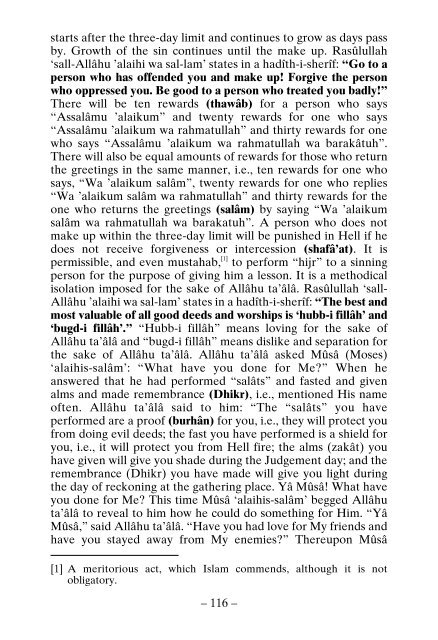Ethics of Islam
Ethics of Islam is taken from the book Berîka by Muhammad Hâdimi. Immorality and ways to get rid of it; 40 depravities and cures to them; usefulness of ethics; what is a soul; strengths of a soul; Personalities emanating from wisdom, courage, chastity and justice are extensively explained.
Ethics of Islam is taken from the book Berîka by Muhammad Hâdimi. Immorality and ways to get rid of it; 40 depravities and cures to them; usefulness of ethics; what is a soul; strengths of a soul; Personalities emanating from wisdom, courage, chastity and justice are extensively explained.
You also want an ePaper? Increase the reach of your titles
YUMPU automatically turns print PDFs into web optimized ePapers that Google loves.
starts after the three-day limit and continues to grow as days pass<br />
by. Growth <strong>of</strong> the sin continues until the make up. Rasûlullah<br />
‘sall-Allâhu ’alaihi wa sal-lam’ states in a hadîth-i-sherîf: “Go to a<br />
person who has <strong>of</strong>fended you and make up! Forgive the person<br />
who oppressed you. Be good to a person who treated you badly!”<br />
There will be ten rewards (thawâb) for a person who says<br />
“Assalâmu ’alaikum” and twenty rewards for one who says<br />
“Assalâmu ’alaikum wa rahmatullah” and thirty rewards for one<br />
who says “Assalâmu ’alaikum wa rahmatullah wa barakâtuh”.<br />
There will also be equal amounts <strong>of</strong> rewards for those who return<br />
the greetings in the same manner, i.e., ten rewards for one who<br />
says, “Wa ’alaikum salâm”, twenty rewards for one who replies<br />
“Wa ’alaikum salâm wa rahmatullah” and thirty rewards for the<br />
one who returns the greetings (salâm) by saying “Wa ’alaikum<br />
salâm wa rahmatullah wa barakatuh”. A person who does not<br />
make up within the three-day limit will be punished in Hell if he<br />
does not receive forgiveness or intercession (shafâ’at). It is<br />
permissible, and even mustahab, [1] to perform “hijr” to a sinning<br />
person for the purpose <strong>of</strong> giving him a lesson. It is a methodical<br />
isolation imposed for the sake <strong>of</strong> Allâhu ta’âlâ. Rasûlullah ‘sall-<br />
Allâhu ’alaihi wa sal-lam’ states in a hadîth-i-sherîf: “The best and<br />
most valuable <strong>of</strong> all good deeds and worships is ‘hubb-i fillâh’ and<br />
‘bugd-i fillâh’.” “Hubb-i fillâh” means loving for the sake <strong>of</strong><br />
Allâhu ta’âlâ and “bugd-i fillâh” means dislike and separation for<br />
the sake <strong>of</strong> Allâhu ta’âlâ. Allâhu ta’âlâ asked Mûsâ (Moses)<br />
‘alaihis-salâm’: “What have you done for Me?” When he<br />
answered that he had performed “salâts” and fasted and given<br />
alms and made remembrance (Dhikr), i.e., mentioned His name<br />
<strong>of</strong>ten. Allâhu ta’âlâ said to him: “The “salâts” you have<br />
performed are a pro<strong>of</strong> (burhân) for you, i.e., they will protect you<br />
from doing evil deeds; the fast you have performed is a shield for<br />
you, i.e., it will protect you from Hell fire; the alms (zakât) you<br />
have given will give you shade during the Judgement day; and the<br />
remembrance (Dhikr) you have made will give you light during<br />
the day <strong>of</strong> reckoning at the gathering place. Yâ Mûsâ! What have<br />
you done for Me? This time Mûsâ ‘alaihis-salâm’ begged Allâhu<br />
ta’âlâ to reveal to him how he could do something for Him. “Yâ<br />
Mûsâ,” said Allâhu ta’âlâ. “Have you had love for My friends and<br />
have you stayed away from My enemies?” Thereupon Mûsâ<br />
[1] A meritorious act, which <strong>Islam</strong> commends, although it is not<br />
obligatory.<br />
– 116 –

















